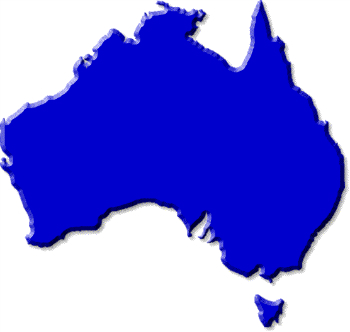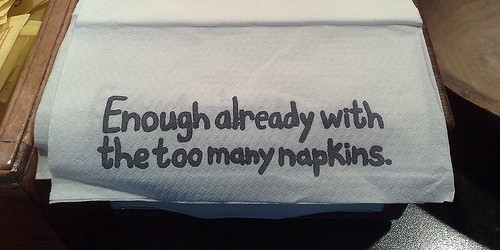Apparently I have a confession to make: I was, until this time, unaware of the fascinating depth of the world of paper napkins.
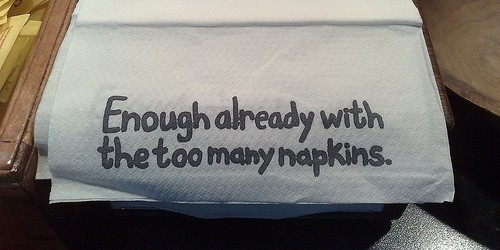 Word.osde8info via flickrTo begin with, there was my discovery that there are “lunch napkins” — the square, scratchy kind — and “dinner napkins,” the comparatively elegant, rectangular, softer kind. Seriously? I’d never noted this distinction at the store, let alone honoring it at my dinner (I mean lunch) table.
Word.osde8info via flickrTo begin with, there was my discovery that there are “lunch napkins” — the square, scratchy kind — and “dinner napkins,” the comparatively elegant, rectangular, softer kind. Seriously? I’d never noted this distinction at the store, let alone honoring it at my dinner (I mean lunch) table.
More to the point, there are my newfound feelings of confusion over my lifelong paper-napkin use. Do I, like the average American, really use 2,200 paper napkins a year? Could I, along with my fellow Americans, use one less napkin a day and save a billion pounds of tree-killing, chlorine-bleached napkins from heading to the landfills? Should I invest in bamboo cloth and PVC-free rings and join the ranks of virtuous wipers who reuse their napkins for several days?
The cloth vs. disposable debate has a certain ring of familiarity to it, and your leanings will depend upon squeamishness, upbringing, and other factors. If you are among those who use disposable napkins regularly or occasionally, this great offense can be somewhat ameliorated by buying those made from recycled paper. But do the suckers work?
I found six brands of lunch napkins and put them through a series of tests. First there were the everyday encounters: pizza grease, grape jam, maple syrup, spilled water. Then there were the wet and dry strength tests. Then there were the in-a-pinch tests: How did the napkin perform as an ersatz rag for stove cleaning? Mirror polishing? Nose blowing?
Here’s what I found:
Scott Naturals by Kimberly-Clark
Eco-claim: A “sensible blend” of 80 percent recycled fiber
Price/quantity: $4.29/400 one-ply napkins
Cute slogan: “Green done right”
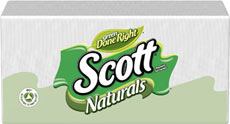 Just a few months ago, the launch of the Scott Naturals line incurred the wrath of activists including Forest Ethics’ Ginger Cassady, who wrote a scathing op-ed right here on ye olde Grist. But last week’s news of sustainable commitments by parent company Kimberly-Clark has given treehuggers new hope. Still, this product is the least impressive of the lot, in eco-terms: with a comparatively piddling 80 percent recycled fiber and a pretty flimsy feel, it’s more pretender than contender. It did rank among the most absorbent in these tests, but loses major points for scratchiness.
Just a few months ago, the launch of the Scott Naturals line incurred the wrath of activists including Forest Ethics’ Ginger Cassady, who wrote a scathing op-ed right here on ye olde Grist. But last week’s news of sustainable commitments by parent company Kimberly-Clark has given treehuggers new hope. Still, this product is the least impressive of the lot, in eco-terms: with a comparatively piddling 80 percent recycled fiber and a pretty flimsy feel, it’s more pretender than contender. It did rank among the most absorbent in these tests, but loses major points for scratchiness.
365 Everyday Value by Whole Foods
Eco-claims: 100 percent recycled paper (80 percent post-consumer content), whitened without chlorine bleach, fragrance free
Price/quantity: $2.99/250 one-ply napkins
Cute slogan: None
 As usual, we’ve included the 365 “brand” in this lineup, even though it’s secretly someone else’s brand in Whole Foods’ packaging. That’s how private-label products work, friends! In this case, I’m fairly certain the secret brand is Marcal (see below), judging by the identical pattern, performance, and price point. Would these do as everyday table napkins? Absolutely. Do they hold up under heavy-duty oven-cleaning and strength tests? Not hardly.
As usual, we’ve included the 365 “brand” in this lineup, even though it’s secretly someone else’s brand in Whole Foods’ packaging. That’s how private-label products work, friends! In this case, I’m fairly certain the secret brand is Marcal (see below), judging by the identical pattern, performance, and price point. Would these do as everyday table napkins? Absolutely. Do they hold up under heavy-duty oven-cleaning and strength tests? Not hardly.
Green Forest by Planet Inc.
Eco-claims: 100 percent recycled paper (minimum 90 percent post-consumer content), whitened without chlorine, unscented
Price/quantity: $3.69/250 one-ply napkins
Cute slogan: “Soft on nature”
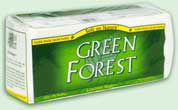 The curious history of this brand wends from its creation at a small Wisconsin paper company to near-demise under the Georgia-Pacific umbrella to rescue by “Planet Inc.” in 2005. Methinks, based on pattern and performance, that these too are a private-label version, this time of Seventh Generation’s product*. [Apparently methought wrong; click on the asterisk for details.] Unlike that company, Green Forest uses a reclosable bag and boasts of a “special partnership” with River Network. Performance-wise, the napkins were strong, although they crumbled a bit under pressure. They’re on the softer side of the spectrum, which is sweet on the schnozz.
The curious history of this brand wends from its creation at a small Wisconsin paper company to near-demise under the Georgia-Pacific umbrella to rescue by “Planet Inc.” in 2005. Methinks, based on pattern and performance, that these too are a private-label version, this time of Seventh Generation’s product*. [Apparently methought wrong; click on the asterisk for details.] Unlike that company, Green Forest uses a reclosable bag and boasts of a “special partnership” with River Network. Performance-wise, the napkins were strong, although they crumbled a bit under pressure. They’re on the softer side of the spectrum, which is sweet on the schnozz.
Small Steps by Marcal
Eco-claims: 100 percent premium recycled paper, whitened without chlorine bleaching, no dye or fragrance added
Price/quantity: $2.99/250 one-ply napkins
Cute slogan: “A small, easy step to a greener Earth”
 Based in New Jersey, Marcal says it’s been “saving trees since 1950” by making paper from recycled paper. The company has gotten super PR-savvy of late, rebranding its napkins, TP, tissues, and paper towels as “Small Steps” products and encouraging customers to “help us save 1 million trees” (a ticker on its website counts more than 21 million trees saved since 2000 — three cheers for underpromising and overdelivering!). While these napkins would be fine for everyday use, they did not hold up as well in strength tests. However, I give Marcal extra points for its reusable drawstring package.
Based in New Jersey, Marcal says it’s been “saving trees since 1950” by making paper from recycled paper. The company has gotten super PR-savvy of late, rebranding its napkins, TP, tissues, and paper towels as “Small Steps” products and encouraging customers to “help us save 1 million trees” (a ticker on its website counts more than 21 million trees saved since 2000 — three cheers for underpromising and overdelivering!). While these napkins would be fine for everyday use, they did not hold up as well in strength tests. However, I give Marcal extra points for its reusable drawstring package.
Full Circle Foods Paper Napkins
Eco-claim: 100 percent recycled paper (80 percent post-consumer content), whitened without chlorine bleach
Price/quantity: $2.99/300 one-ply napkins
Cute slogan: “Return to a natural way of living”
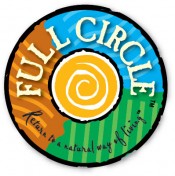 At first blush, these napkins struck me as the weakest of the bunch. They were softer than the others, and seemed thinner — they almost felt like a facial tissue or toilet paper. But damned if they didn’t perform like a champ. They handled maple syrup, grape jam, and pizza grease with aplomb, scored up there with eco-faker Scott’s on absorbency, and held their own in a drip test too. Give me a reusable package, and I’d be in lunch-napkin heaven.
At first blush, these napkins struck me as the weakest of the bunch. They were softer than the others, and seemed thinner — they almost felt like a facial tissue or toilet paper. But damned if they didn’t perform like a champ. They handled maple syrup, grape jam, and pizza grease with aplomb, scored up there with eco-faker Scott’s on absorbency, and held their own in a drip test too. Give me a reusable package, and I’d be in lunch-napkin heaven.
Seventh Generation Recycled Napkins
Eco-claims: 100 percent recycled paper (80 percent minimum post-consumer content), whitened without chlorine bleach, free of dyes and fragrances; this recycled paper product helps fight global warming; saves natural resources, reduces pollution
Price/quantity: $3.69/250 one-ply
Cute slogan: “In our every deliberation …” — you know the drill
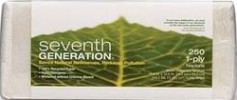 The grandpappy of green household products scores fairly well in the napkin department — commendably strong when both wet and dry, they left the least residue when wiping maple syrup and were bearably soft on the nose. But they landed on the weak side when pressed into oven-cleaning service, and felt a bit drippier than some of the others.
The grandpappy of green household products scores fairly well in the napkin department — commendably strong when both wet and dry, they left the least residue when wiping maple syrup and were bearably soft on the nose. But they landed on the weak side when pressed into oven-cleaning service, and felt a bit drippier than some of the others.
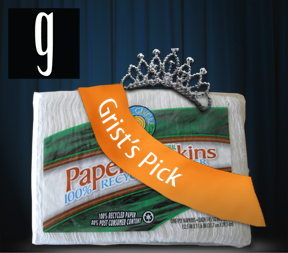 The Bottom Line: Full Circle wiped away the competition, based on performance, softness, and strength. While the Seventh Generation/Green Forest* version fared slightly better than the Small Steps/365 version, any of them would make a fine table napkin. And all are better than Scott’s Unnaturals, which uses less recycled content and is bleached with chlorine; it’ll be interesting to see whether Kimberly-Clark greens up this product over the next few years in light of its new sustainability commitments.
The Bottom Line: Full Circle wiped away the competition, based on performance, softness, and strength. While the Seventh Generation/Green Forest* version fared slightly better than the Small Steps/365 version, any of them would make a fine table napkin. And all are better than Scott’s Unnaturals, which uses less recycled content and is bleached with chlorine; it’ll be interesting to see whether Kimberly-Clark greens up this product over the next few years in light of its new sustainability commitments.
*The public affairs manager from Planet, Inc., contacted me after publication to clarify that Green Forest is “absolutely not” a sub-brand or private-label version of Seventh Generation and that the companies are in fact competitors.
